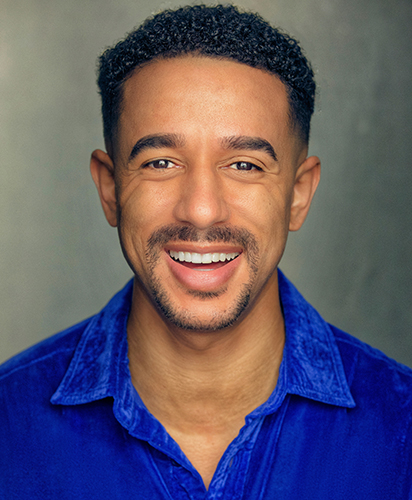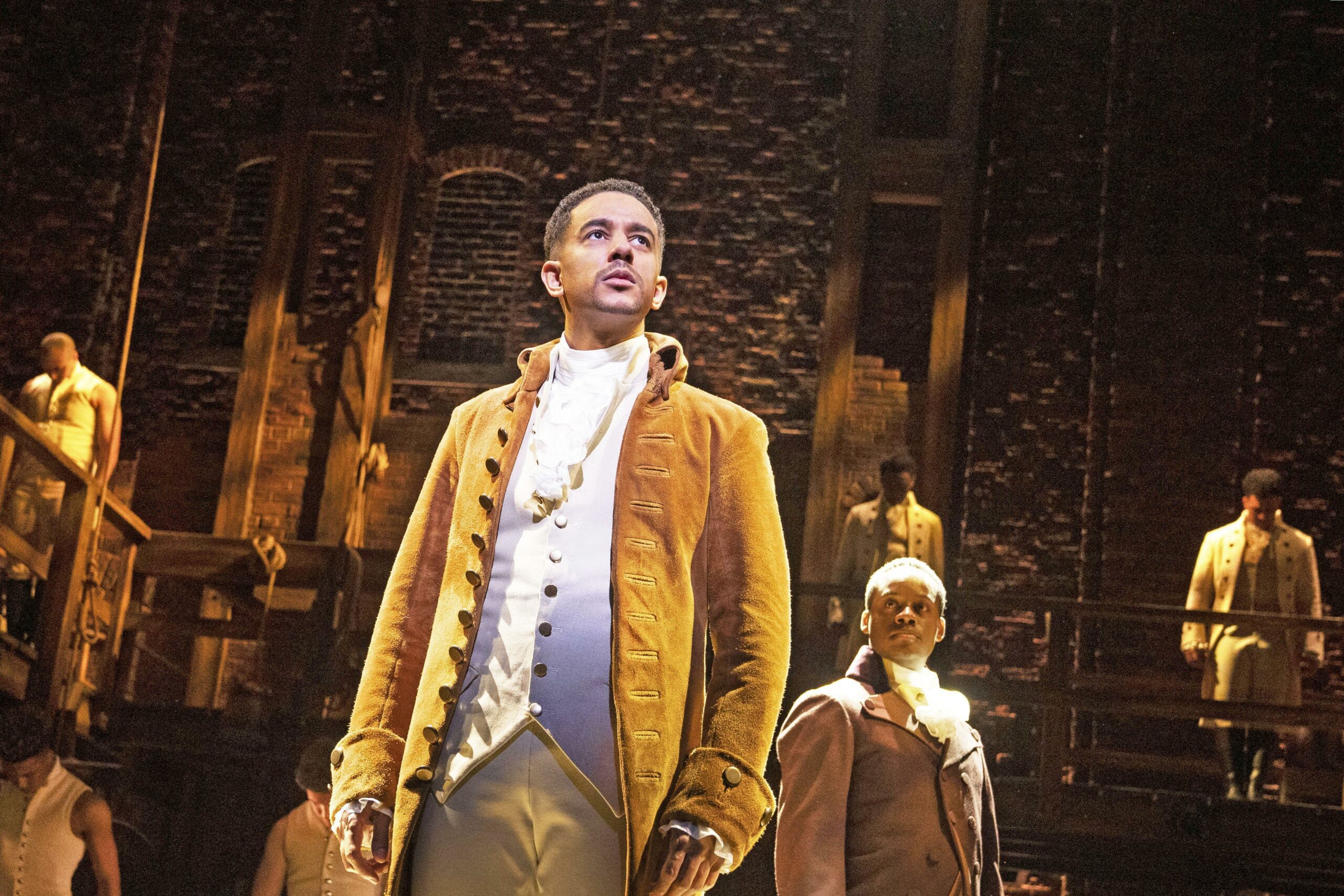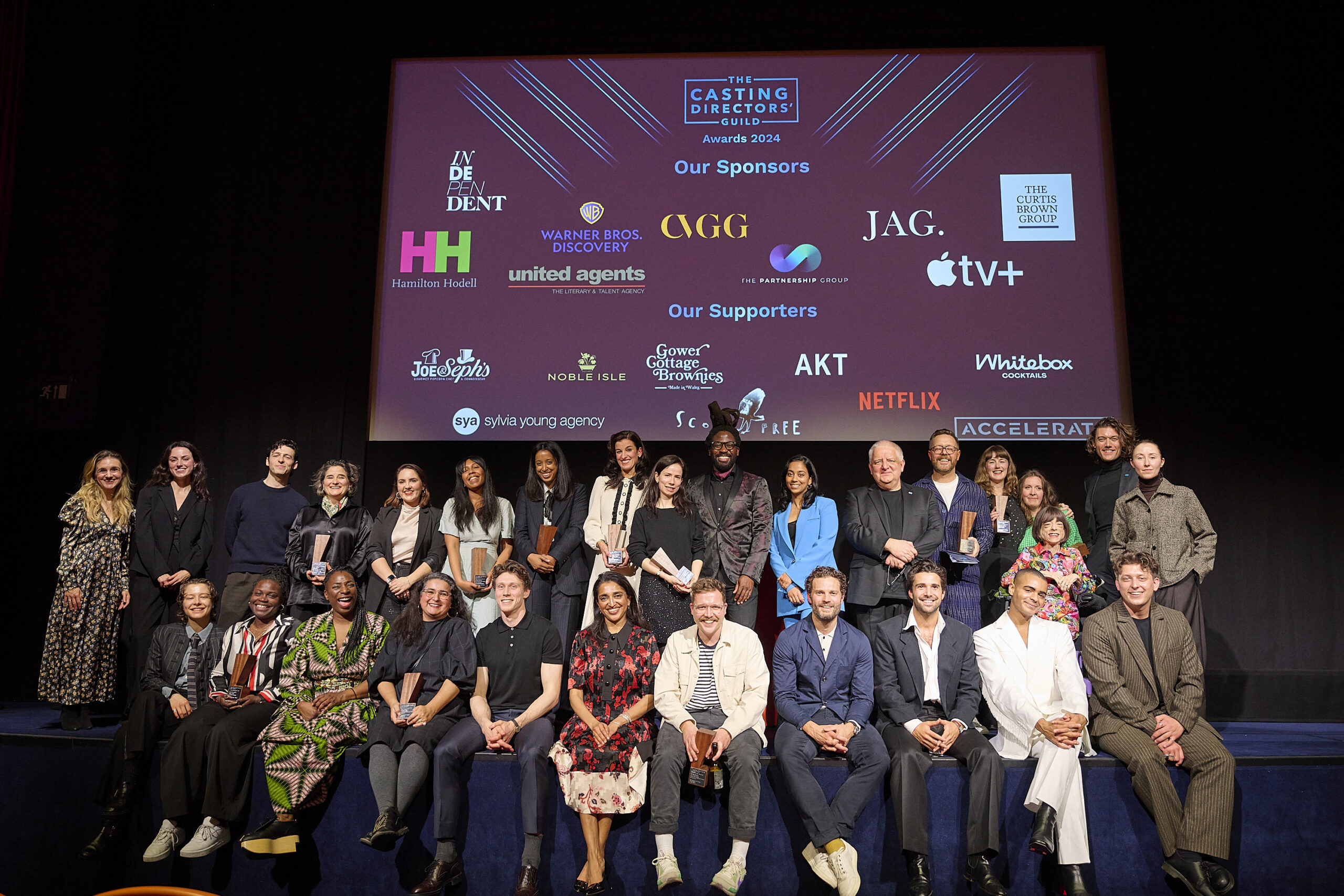Performer Karl Queensborough tells us about playing the lead in ‘Hamilton’ and offers advice for actors hoping to appear in the West End.
Spotlight member Karl Queensborough has appeared in various productions, but most notably he played the lead role of ‘Alexander Hamilton’ in the worldwide phenomenon Hamilton on the West End.
We got the chance to ask Karl about his experience playing this iconic role, including what Hamilton’s audition process was like, how acting on stage varies from acting on screen and what advice he has for other actors hoping to take to the West End. Here’s what he shared:
Hi Karl! What first inspired you to become an actor?
When I was a kid, I always knew that I had the bug for performing, a yearning. If I could pinpoint it, I remember being 11 years old and watching the first Harry Potter film in the cinema. Before that, I did a few plays and concerts at school but hadn’t made the conclusive decision to do this as a career.
I had so much energy as a kid and I loved putting [it] into getting up on my feet and performing. I ended up seeing the first Harry Potter film six times in the cinema and I just fell in love with the whole world and the majestic nature of it all. It took me away from that room in the cinema completely. From then on, I just said to myself, “I want to do what they’re doing.”
I’ve always been a massive fan of Jim Carrey movies and Robin Williams, too – Robin’s a massive acting hero of mine and really defined my childhood with his iconic roles. So, I suppose I wanted to and always did, imitate them, and I wanted to equal what they did and bring that sense of wonder to others.
What was it like playing an iconic role like ‘Alexander Hamilton’ in Hamilton?
Playing that role was my West End debut and that’s the biggest role I’ve ever played to date. The great thing about it was that each show was individually unique and that could be down to things like the audience’s energy. They might react to something you didn’t expect them to react to, so it keeps you on your toes, or if multiple covers were performing it brought freshness to the show.
When you’re on stage, it’s pitch black, [so] you can’t see the circle or the upper circle from your standpoint, but you catch a few front rows of the stalls. And when you catch people’s faces, especially young fans or families who were really eager to see the show, it gives you that extra influx of energy.
I’ll admit, when I first auditioned for Hamilton, I really didn’t know the plot of the show. I didn’t train in musical theatre, so my knowledge of the subject wasn’t as extensive. And I remember back in 2015 or 2016, they announced it was coming to the West End, and everyone on Facebook was going crazy. I was driving to Liverpool on a touring job and my cast mate said, “Look, not only do you have to listen to this, you have to audition for it as well.” And I said, “Okay, okay, I’ll give it a listen.”
I remember listening to ‘My Shot’ for the first time, and I had to pause it a minute in because I was blown away by the lyrics, the speed, the rhythm and the emotions the song evoked in me. At that point, to be seen was cemented in my mind. Unfortunately, I didn’t get to audition for the original cast as I had another job that clashed, but I was thankful to get the opportunity afterwards.
And then fast-forward to actually playing ‘Hamilton’ himself on stage. It was unbelievable. If I was in my first year of drama school and [someone] said, “You’re going to be playing this role in the West End,” I would’ve said, “There’s no way.”
What was the Hamilton audition process like?
I think, all in all, it was about four months. Initially, I went in and they just wanted two contrasting songs, so I remember I performed Justin Timberlake’s ‘Senorita’, because there’s a little rap-ish section, and The Beatles’ ‘Come Together’. So that was the first round. Then I got a callback.
Over the whole process, I think I must’ve gone in about six or seven times. Because I wasn’t super, super familiar with the music, for the second round they sent me about six or seven songs – not the whole songs, it was snippets. I was a bit like, “I don’t really know any of these, so I’m going to have to really, really work hard.”
I really wanted to be off-book and super confident with the material. I would even be going through the material in my dressing room in the show I was currently in (The Little Match Girl at the Globe Theatre).
It was a lovely process and all the team were super supportive, and they really encouraged me to put my own spin on things, not to try and imitate what Lin-Manuel Miranda or any of the original cast in America had done. Which was refreshing and extremely freeing.
When I did my last audition, I didn’t hear anything for about maybe two months, so I just said to myself, “I’m just happy I got that far. I’ve never really done anything like this before, so I was just grateful to be seen multiple times.”
And then I was appearing in Sylvia at the Old Vic, and we were about to run the whole show in the rehearsal room and just before the tea break finished, my agent called me and said, “They want you to play the alternate Hamilton.”
Honestly, that was the longest run of a show I’ve ever done because I was just itching and bursting inside to tell everyone what just happened.
How did you go about forgetting about the audition and dealing with the uncertainty of whether you got the role?
As long as you know that you’ve put 100% into that work, and you prepped and you’ve given it your all, I think the rest is out of your hands. I just took the positives from it. I just said, “Look, I’ve got six, seven rounds in, that’s fantastic. If it doesn’t happen, try again next year. At least this time, if I go next year, I know what to expect. I’d be a little less nervous, I’ll know them.”
And also, I was currently doing a job, so I was like, “I’m in work at the moment, I’m having a great time. So, if I don’t get this ‘Hamilton’ role, it’s fine, this won’t be the last time I’ll be in a room.”
You just have to let it go, focus on the next audition or just focus on whatever you’re doing, like attending a class or honing on your craft. When you let it go from your mind, that’s when you get the job. Or if you really want to get a job, book a holiday and that’s when the job comes in or an audition – it’s always the way!
What was the experience of performing on the West End like?
When I took over the role full-time, I would do seven shows a week. It was just a learning curve of how to vocally and physically survive, because I remember when I did my first proper week playing ‘Hamilton’, by show three I was exhausted because I was so excited and was giving it 110%.
You can’t really do that, because you have to last all the way until the end of the week. It’s not to say that the shows earlier in the week have to be under-energised, you’ve just got to be really strategic on how to sustain that stamina to last the full week.
It was like I was still going through drama school and assessing how I felt and looking after my voice and looking after myself physically as well, and just knowing where to place energy.
Just being in the West End community as well. It’s weird – you always know someone who knows someone. If you want to get tickets to a show you’d be like, “Does anyone know anyone in The Lion King? Can you get me cast rates?” Stuff like that. Everyone knows everyone and everyone supports everyone, which is really great.
It’s also weird leaving my house. I live in northwest London, and [I’m] just travelling into work to perform on the West End stage and play ‘Hamilton’ in Hamilton, which is this huge worldwide phenomenon of a show. I live in a chilled, working class area. Even after a show I just go, “I’ve just performed in the West End and I’m just walking home like it’s nothing.” It’s crazy.
I’ve made lovely friendships and wonderful connections through the West End as well and I’m eternally grateful for the opportunities stemming from this show. And it’s great keeping up with everyone’s career and supporting everyone and going to see shows that other people in the West End are in. It’s a really special community.
What advice would you give to actors hoping to make it to the West End stage one day?
If acting is your passion, just keep working on it as much as you can. I mean, obviously it’s good to take rest and recuperate and invest in self-care – I’m a big believer in this. Attend open calls as well, and that will just help you grow. If you’re not too confident, try to face that uncomfortable zone and just see what happens because if that situation comes up again, you’ll be a bit more confident in that area.
Go to as many classes as you can. There are loads of masterclasses that are happening as well. See as many shows as you can because shows can change your opinions on things and open your mind. Even if it’s this particular role that you like, watch multiple actors who have portrayed the same role and see what they do differently.
No one’s going to perform a character like you can, everyone’s individual. Watch films and read to further develop your opinion of the world.
If you’re creative yourself, create art and keep your mind ticking over, write monologues, write scenes, get together with friends and just act every day. This is why I went to drama school, because I got to do what I loved every day with a group of people.
I think it’s really important not to compare yourself to others as well. If you see other people gaining roles, it can be really easy to go, “God, why wasn’t that me?”
And honestly, your time will come. There’s no set time limit for when you can make it.

Headshot credit: Michael Shelford
How do you deal with nerves before going on stage?
I’m a massive fan of meditation and use the Headspace app a lot. If we’re called at 6pm for a warmup, I’ll come in at 5:30pm and I’ll do half an hour of vocal stuff by myself. Then everyone gathers on stage, stretches [and] does a group warmup. And then I’ll always meditate for about 10 to 15 minutes before a show.
Just for me personally, it’s nice to take out anything that’s happening to get a moment of stillness, reflection and being present. If it was a busy tube journey, anything that you’ve got going on, you just try and let that go for three hours while you’re doing this show.
When you’re nervous, it feels horrible when you’re going through it, but I think it shows that you care passionately about what you’re doing and you want to do a good job. If you do get nervous, just change that thought into, “Okay, I’m nervous, but I’m going to turn that into excitement,” and that’s like the adrenaline of performing.
If you are nervous, focus your attention on the audience, because the audience is not going to come to see [your show] and go, “I really want to see someone mess up.” They want to have a good time, to escape for a couple of hours and be entertained.
I know with Hamilton, sometimes people book tickets six months in advance. They’ve been counting down all that time to come and see the show, so let’s give them the best show that we can. It’s nice to sometimes turn the attention away from yourself and think, “Someone could be having a bad time right now, and if we can offer some escapism to them for two and a half hours, then we’ve done our job.”
How do you prepare to transition from acting on stage to acting on screen?
[During the pandemic] I took active screen classes online. I worked a lot with a company called Mixing Networks, where they would give you screen acting classes with seasoned pros and directors, and top casting directors as well, which was incredible. It really helped me notice the difference between theatre and film and adapt accordingly. It literally kept me sane during the lockdowns.
With theatre, there is room to be big and bold and you can physically expand in a space, but with screen, it’s a bit more nuanced. I think your movements are really strategically planned. It’s not always the case, but there’s a stark difference in performance quality.
Even stuff like blinking and eye lines and hitting your mark, it’s like algebra for acting. That camera is so close on your face, especially for close-ups, and so focused, you’ve got to really just relax into a conversational, natural way of speaking. Even in terms of your volume, what location are you in, do you want to be overheard and what’s your relationship to the scene partner?
I have a lot of energy, so that’s why theatre acting is great because I can really expand in a space and be big and bold. But it’s nice to control that energy and transform that into a smaller version of that for TV and film.
Do you have any tips for learning lines?
I know it’s obvious, but just repetition, repetition, repetition. And associating for me, physically. If you can match a physicality, pinpointing where you are on the map on stage, and associating that with your lines and what you say, I think that can help a lot. Always speaking the lines out loud and exploring various gestures to gain a physical response from your text.
Once you get familiar with the lines, just write the lines out yourself so it feels like the words are coming from you. I think highlighting keywords is a good idea as well as marking out the punctuation and thoughts.
And also, being aware of what your cue line is. An exercise we were doing in drama school is you close your eyes and listen to what the other person is saying, and you organically repeat back any bit of text or word they have spoken that triggers a response from you, a need for your character to speak.
Another technique I use is if I’m saying a line, what’s the subtext beneath that? What else is the character trying to say without actually trying to say that? Or I rewrite the line keeping in line with the same context, but with an alternate response or dialogue.
What would be your dream role?
This is where the nerd in me comes out. I have been a fan of Star Wars since I was seven years old. All the movies, all the series – I’m absolutely hooked! I watch breakdown videos and the history of all the characters and stuff like that – proper nerdy! So, to have a part in one of the Star Wars series or movies, I’ll take absolutely anything. I know there’s a new trilogy coming out in a couple of years. Even if it’s just one line going, “He’s over there,” that’s it – I’m happy.
Thanks to Karl for taking the time to talk to us. Book tickets to see ‘Hamilton’ here.
Take a look at our website for more casting stories and advice about getting into musical theatre.












